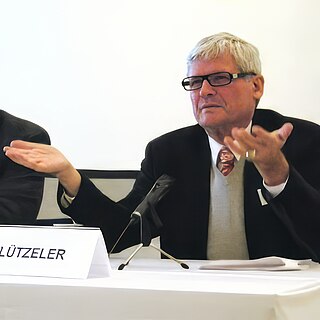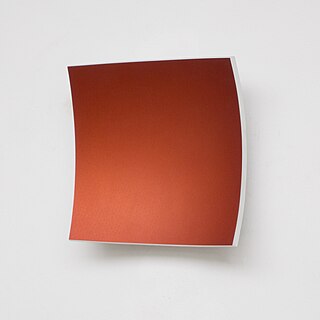Related Research Articles
The Arbeitsrat für Kunst was a union of architects, painters, sculptors and art writers, who were based in Berlin from 1918 to 1921. It developed as a response to the Workers and Soldiers councils and was dedicated to bringing current developments and tendencies in architecture and art to a broader population.

The Grand-Ducal Saxon Art School, Weimar was founded on 1 October 1860, in Weimar, Germany, by a decree of Charles Alexander, Grand Duke of Saxe-Weimar-Eisenach. It existed until 1910, when it merged with several other art schools to become the Großherzoglich Sächsische Hochschule für Bildende Kunst. It should not be confused with the Weimar Princely Free Drawing School, which existed from 1776 to 1930 and, after 1860, served as a preparatory school.

Paul Michael Lutzeler is a German-American scholar of German studies and comparative literature. He is the Rosa May Distinguished University Professor Emeritus in the Humanities at Washington University in St. Louis.

Alice Salomon was a German social reformer and pioneer of social work as an academic discipline. Her role was so important to German social work that the Deutsche Bundespost issued a commemorative postage stamp about her in 1989. A university, a park and a square in Berlin are all named after her.

Hans Unger was a German painter who was, during his lifetime, a highly respected Art Nouveau artist. His popularity did not survive the change in the cultural climate in Germany after World War I, however, and after his death he was soon forgotten. However, in the 1980s interest in his work revived, and a grand retrospective exhibition in 1997 in the City Museum in Freital, Germany, duly restored his reputation as one of the masters of the Dresden art scene around 1910.

Susanne Rode-Breymann is a German musicologist, and from 2010 until March 2024 the president of the Hochschule für Musik, Theater und Medien in Hanover.
Hans Jantzen was a German art historian who specialized in Medieval art.
Wulf Herzogenrath is a German art historian and art curator. He is a leading expert in the fields of Video Art, New Media Art and the Bauhaus. He has assembled a large collection of artist's books.
Sabine Funke is a German painter who lives and works since 1987 in Karlsruhe.

Heiner Thiel is a German sculptor and curator. He is an exponent of concrete art.

Hermann Stenner was a German Expressionist painter and graphic artist.
Alma Stephanie Wittlin, Alma S. Wittlin, was an Austrian writer. Her surname also appears as Wittlin-Frischauer.
Karin Flaake is a German sociologist and professor (retired) at the Carl von Ossietzky University Oldenburg. Her publications on the adolescence of young women and men are part of the literature of socio-psychologically oriented gender research. Another focus of her work is on the chances of changing gender relations in families.
Claudia von Werlhof is a German sociologist and political scientist. She held the first professorship for women's studies in Austria, based at the Institute for Political Science at the University of Innsbruck.
Gabriele Fritsch-Vivié is a German theatre studies schlolar, playwright and journalist. A member of the working group "Women in Exile", she focuses on biographies of political repression in the first half of the 20th century.
Inge Hansen-Schaberg is a German educational researcher.
Beatrice von Bismarck is a German art historian, curator, author and professor for art history and Bildwissenschaft.
Hanna Deinhard was a German-Brazilian-US art historian.
Maria Kublitz-Kramer is a German literary scholar and was a lecturer at the Oberstufen-Kolleg Bielefeld.
Irene Stoehr was a German feminist historical social scientist and journalist. Her main research interests were the feminist movement and gender history in the 20th century.
References
- ↑ Art History Institute of Florence: Irene Below: Florence 1935-1938
- ↑ Kathrin Hoffmann-Curtius: Feministische Kunstgeschichte heute: Rück- und Vorschläge. In Critical Reports 2, 1999, p. 26.
- ↑ Quoted after Irene Below: When art breaks out of its elitist white ghetto ... (Liz Crossley) "An other 1995" in Trier (PDF file; 170-kB), retrieved 19 November 2020
- ↑ Quoted after Ralph Findeisen: Unbewusster Neokolonialismus artnet 2006, retrieved 19 November 2020
- ↑ Aufbruch in Bielefeld - Linksruck, Der Bielefelder
- ↑ Westfalen-Blatt, 23 September 2019 Anders altern, retrieved 19 November 2020
- ↑ Mentioned after Irene Below: Lucy von Jakobi Webarchiv Kunsthistorisches Institut in Florenz, retrieved 19 November 2020
- ↑ Kerberverlag To Open Eyes, retrieved 19 November 2020